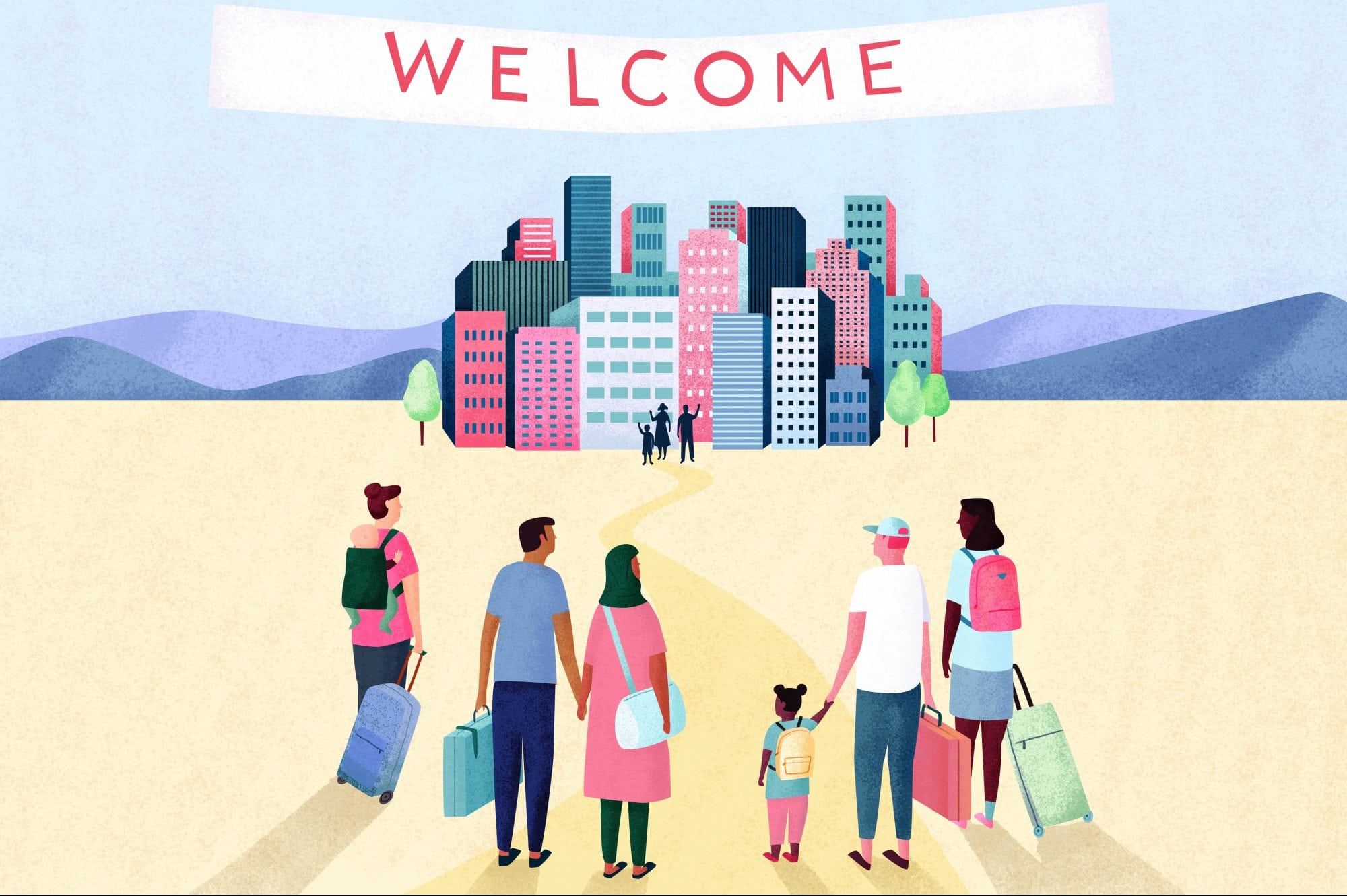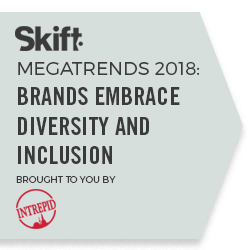Skift Take
Travel brands no longer get political at their own risk — they avoid politics at their own risk. With so much at stake in the Trump era, remaining on the sidelines about multicultural acceptance isn’t an option.

Skift Megatrends 2018
In January 2018 released our annual travel industry trends forecast, Skift Megatrends 2018. You can read about each of the trends on Skift, or download a copy of our magazine here.
This Megatrend is brought to you in partnership with Intrepid.
Things were never quite the same after President Donald Trump’s first travel ban, decried by civil liberties groups as a discriminatory Muslim ban.
Three travel bans in, companies are finding that speaking out about multicultural acceptance, diversity, and inclusion isn’t a risky move, or even the new normal — it’s the new mandatory.
In such a polarized environment, brands can’t afford to support the travel ban, border wall, or other isolationist ideas, all of which make travel harder and hurt bottom lines. Arguably, brands can’t even afford to remain neutral when so much is at stake, which is turning executives into activists of multicultural acceptance.
The first travel ban elicited widespread condemnations from those targeted by the order and other people of color, both within the travel community and outside it. But what was more unusual were condemnations from the CEOs of Expedia, TripAdvisor, and other huge corporations — even those that are usually too risk-averse to get political. Dara Khosrowshahi, who was then CEO of Expedia and is now Uber’s CEO, is himself an immigrant from Iran, which was included in all three versions of the ban.
In an interview backstage at Skift Global Forum in September, Delta Air Lines CEO Ed Bastian discussed the uncertainty that reigned in 2017.
“The political rhetoric was not good; it was very divisive,” he said. “You had a lot of nationalists, not just in the U.S., but Brexit and other parts of the world as well. There was a lot of fear regarding the ability to bring people together or is it safe to travel.”
President Trump’s ability to torpedo the U.S. tourism industry makes it easier for U.S.-based travel leaders to speak out, but similar factors are not at work in the European Union. Before the June 2016 Brexit vote, airlines and tour operators were mostly united in pushing for a “remain” vote, but with the UK now set to leave, travel executives seem quietly accepting.
Michael O’Leary, the outspoken boss of Irish low-cost carrier Ryanair, is an exception. While not criticizing the Brexit decision, he frequently lambasts politicians for their lack of action. In addition, some in the EU hospitality industry voice concerns that resurgent nationalism may mean fewer EU migrants staying in the country, which would devastate hotels and restaurants.
For all the talk of rising nationalism across the EU, there was no big breakthrough politically for the far right in 2017. In France, centrist Emmanuel Macron comfortably beat the National Front’s Marine Le Pen. German federal elections were less conclusive, with Chancellor Angela Merkel still hoping to stay in power in a new coalition government, but the big unresolved challenge remains Brexit and the future shape of the EU without the UK.
Social issues have also occasionally prompted travel executives outside the U.S. to speak up. Alan Joyce, CEO of Australian airline Qantas, took time during one of the company’s earnings calls to support the legalization of same-sex marriage, and urged others to do the same. It was a rare but courageous decision, and recently, lawmakers voted to legalize same-sex marriage in the country.
Back in the United States, unusually strong messages appear more and more frequently in marketing campaigns. Expedia ran an anti-border wall video, Airbnb ran a Super Bowl ad promoting multicultural acceptance, Hyatt did the same around the Academy Awards, and the Los Angeles tourism board created their “Everyone Is Welcome” campaign.
As discriminatory “bathroom bills” drove away meetings and events in North Carolina, the president and CEO of Visit Dallas announced the “Texas Welcomes All” campaign at the state capitol to protest the state’s proposed bathroom bill and protect those business interests. Paulette Kluge, CEO of the Corpus Christi Convention and Visitors Bureau, said she participated in the campaign and that travel brands are feeling the pressure to get political.
“It just got to the point where we had to get involved,” said Kluge. “I have to stop what my job is and get involved politically. … We can’t allow a few idiots to ruin an industry.”
When asked whether the proposed bill impacted visitation, Kluge said: “I think we’re fine because they didn’t pass it. But we had threats. The Final Four and the Super Bowl, they will not come to a state that has this.”
Politics intersected with leisure travel in New Orleans when the city removed four Confederate monuments and Mayor Mitch Landrieu made a speech about welcoming people of color. Even as fights over the fate of such statues persist throughout the South, some smaller destinations such as Biloxi, Mississippi started to remove these symbols in an effort to make residents and tourists more comfortable.
Diversity and inclusion concerns are heating up internally in boardrooms as companies are forced to look inward. Travis Kalanick, former CEO of Uber, was not only ousted due to allegations of harassment and discrimination, but the company strains to distance itself from his toxic image.
If travel brands are to keep up with the diverse world we live in, they must move past hitting diversity quotas to actual inclusion, listening to these new voices and fully incorporating them into decision-making processes.
Europe Editor Patrick Whyte contributed to this report.
Download Your Copy of Skift Megatrends 2018

This year’s Megatrends are sponsored by our partners at AccorHotels, Allianz Worldwide Partners, Hilton Garden Inn, Intrepid Travel, onefinestay, and Upside.
The Daily Newsletter
Our daily coverage of the global travel industry. Written by editors and analysts from across Skift’s brands.
Have a confidential tip for Skift? Get in touch
Tags: discrimination, diversity and inclusion, megatrends 2018, tourism, travel bans
Photo credit: Travel companies are increasingly speaking out about multicultural acceptance, diversity, and inclusion. Bett Norris / Skift

